US Asks China To Urge Iran To Stop Houthi Attacks In Red Sea
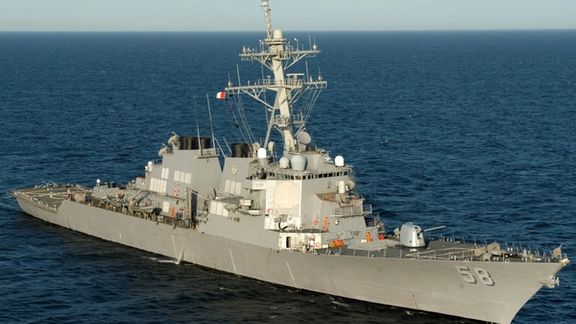
The United States has reportedly called on China to use its influence with Iran to restrain the Houthi forces, who have been attacking commercial ships in the Red Sea.

The United States has reportedly called on China to use its influence with Iran to restrain the Houthi forces, who have been attacking commercial ships in the Red Sea.
However, there have been limited signs of cooperation from Beijing, according to US officials cited in a Financial Times report.
Over the past three months, US officials have consistently raised concerns about these attacks with senior Chinese officials. White House National Security Adviser Jake Sullivan and Deputy National Security Adviser Jon Finer addressed the matter during recent meetings with Liu Jianchao, who heads China's Communist Party's International Liaison Department.
US Secretary of State Antony Blinken also discussed the issue with his Chinese counterpart. Despite these discussions, US officials believe that China has not exerted significant pressure on Iran to curb the Houthi rebels, aside from issuing a mild statement on the subject last week.
Houthis began launching missiles and drones at commercial vessels passing through the strategic Red Sea carrying cargo between Asia and Europe. The attacks began after Iran's Supreme Leader Ali Khamenei called for a blockade of Israel, after war broke out in Gaza.
Earlier, the US military conducted strikes in Yemen, destroying two Houthi anti-ship missiles aimed at the Red Sea and ready for launch. On another occasion, US and British forces conducted strikes targeting a Houthi underground storage site, as well as missile and surveillance capabilities used by the Iran-aligned group for attacks on Red Sea shipping.
The Houthi attacks in the Red Sea have disrupted global shipping and raised concerns about global inflation. They have also heightened worries that the fallout from the Israel-Hamas conflict could further destabilize the Middle East.
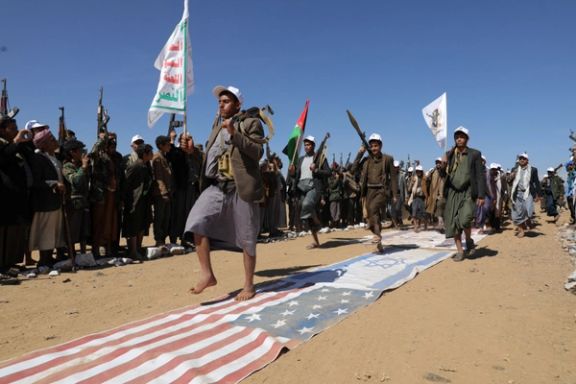
The Pentagon carried out strikes in Iraq against Iran-backed militia on Tuesday, the Pentagon said, after a weekend attack on an Iraqi air base that wounded US forces.
The US military also carried out more strikes in Yemen early on Wednesday, destroying two Houthi anti-ship missiles that were aimed at the Red Sea and were preparing to launch, the US military said in a statement.
The US strikes, which took place at roughly 2:30 a.m. (2330 GMT), are the latest against the Iran-backed group over its targeting of Red Sea shipping, and followed a larger round of strikes a day earlier.
US troops in Iraq and Syria have been attacked about 150 times by Iran-aligned militants since the Israel-Gaza war started in October, creating pressure on President Joe Biden to respond militarily, despite political sensitivities in Baghdad.
On Saturday, four US personnel suffered traumatic brain injuries after Iraq's Ain al-Asad air base was hit by multiple ballistic missiles and rockets fired by Iranian-backed militants from inside Iraq.
"US military forces conducted necessary and proportionate strikes on three facilities used by the Iranian-backed Kataib Hezbollah militia group and other Iran-affiliated groups in Iraq," US Defense Secretary Lloyd Austin said in a statement.
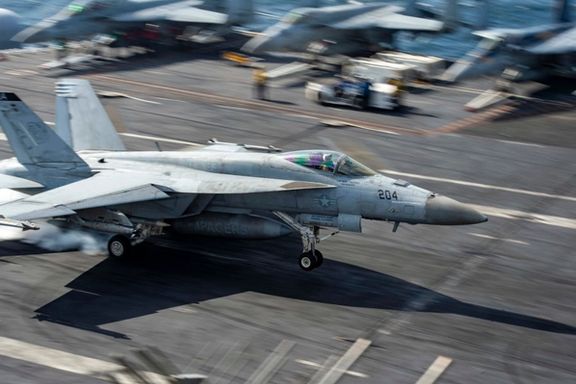
"These precision strikes are in direct response to a series of escalatory attacks against US and Coalition personnel in Iraq and Syria by Iranian-sponsored militias," Austin added.
US Central Command, which carries out operations in the Middle East, said the strikes in three locations targeted Kataib Hezbollah "headquarters, storage, and training locations for rocket, missile" and drone capabilities.
In Iraq, a medical source and a militant source said the US strikes killed at least two militants and that four other people were wounded.
Kataib Hezbollah military spokesperson Jaafar al-Husseini said in a post on X that the group would continue to target "enemy bases" until the end of Israel's seige in Gaza and singled out US support for Israel's campaign.
The Iranian regime has avoided direct military involvement in the Gaza war, preferring not to escalate the conflict to a confrontation with Israel and the US. However, its proxy forces in the Middle East have been widely attacking US and Israeli interests, as well as international shipping in the Red Sea.
The US has 900 troops in Syria and 2,500 in Iraq, advising and assisting local forces to prevent a resurgence of Islamic State, which in 2014 seized large parts of both countries before being defeated.
Iraqi Prime Minister Mohammed Shia al-Sudani's office announced moves to evict US forces following a US drone strike in Baghdad earlier this month that was condemned by the government. The Pentagon said that strike killed a militia leader responsible for recent attacks on US personnel.
Sudani has limited control over some Iran-backed factions, whose support he needed to win power a year ago and who now form a powerful bloc in his governing coalition.
The Pentagon has said it has not been formally notified of any plans to end the US troop presence in the country, and says its troops are deployed to Iraq at the invitation of the government in Baghdad.
Following the US strike, Abo Alaa al-Walai, a militia commander sanctioned by the US last year for involvement in attacks on US forces, said Iran-backed Iraqi militias operating under the banner of the Islamic Resistance in Iraq should expand operations by "enforcing a blockade on Zionist maritime navigation in the Mediterranean Sea."
Iran’s ruler Ali Khamenei has been calling on Muslim countries to blockade Israel since early November.
Reporting by Reuters
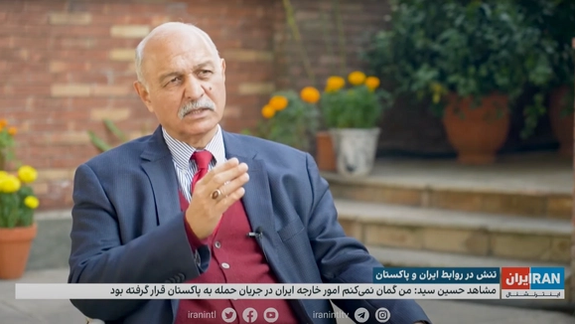
Pakistani lawmaker Mushahid Hussain Syed has suggested Iran’s Revolutionary Guards’ cross-border airstrikes might have occurred without government knowledge.
Senator Hussain Syed, head of Pakistan's Defense Committee, told Iran International that the attack seemed like a “deep state operation” to save face following a series of recent security breaches, the latest of which was twin blasts on the death anniversary of IRGC-Quds Force former commander Qasem Soleimani in Kerman.
“There were issues of security, and the election is coming up in Iran. I think this was an Iranian deep state operation,” he said, explaining that “Iran has multiple centers of power.”
Hussain noted that Iran's Quds Force, which is in charge of operations overseas, has historically played a dominant role in Iran's foreign policy, particularly in countries like Afghanistan, Iraq, Syria, Lebanon, and Yemen, pointing the finger at the body which also manages Iran's regional proxies. “A lot of foreign policy initiatives are not decided by Iran’s Ministry of Foreign Affairs or even by the president perhaps,” he said. “It was their own operation.”
However, it is unlikely that such an operation was not given the green light by the country's Supreme Leader who has the ultimate control of Iran's proxies abroad. “I don't think the Iranian Foreign Minister knew about it, because two hours before the operation he had a very cordial and pleasant meeting with our prime minister in Davos,” he said, suggesting that the operation was kept to a closed circle.
"It was an Iranian deep state operation by their Revolutionary Guards, who operate as a state within a state, and they are very powerful,” he underlined, saying that “Qasem Soleimani was the most powerful man in Iran after the Supreme Leader.” Countries such as the UK have called Iran its number one threat after tens of attacks on its soil have been foiled, coordinated by Iran's Quds Forces and Ministry of Intelligence.
Hussain also noted the timing of Iran's attack on its neighbor, amid heightening regional tensions. He suggested that Iran flexing its military might could be Iran's desire to send a message to Israel, the US and the West that “if you want to attack us, bomb us, we are ready for a military strike.”
He said, “I think it was pressure on Iran after the al-Aqsa Flood operation,” referring to Hamas invasion of Israel on October 7 that was the onset of the escalating Middle East conflict.
By attacking targets in Pakistan, Iraq and Syria within 24 hours, Iran wanted to send a message to the West that it has “the capability, the willingness and the intention” to act militarily if the need arises while its proxies wreak havoc across the region, including Yemen's Houthis blockading the Red Sea. Iran continues to deny its involvement in any of its proxies missions from Hamas in Gaza to Hezbollah in Lebanon.
Iran misjudged the response from Pakistan and Iraq which, following the attacks, both not only recalled ambassadors but lodged legal action at the UN Security Council. Iran also did not account for Pakistan’s retaliatory airstrikes.
Through what Hussain called "stupid action", "Iran has brought Iraq back into the American lap ... lost the goodwill in Pakistan and the region... and also showed that Iran’s military power has its limits.”

The Swedish Ministry of Foreign Affairs is intensifying efforts to release Swedish citizens unlawfully detained in Iran as the number of arrests climbs.
Although the ministry has declined to specify the number of detainees believed to be held by the Iranian regime, recent reports suggest an increase in the number of detained Swedes. The latest was a 60-year-old dual Swedish-Iranian citizen arrested on January 19.
The Swedish foreign ministry summoned Iran's charge d'affaires on January 17 urging the release of all detained Swedish citizens and expressing concern over the missile attack on Erbil, Iraq, on January 15.
On January 16, a Swedish man in his twenties residing in central Iran was also arrested. The ministry cited consular confidentiality for not disclosing further details about the detainee's identity.
TV4 Sweden reported that the charges include "complicity in murder" and "weapons-related crimes" in connection with a fatal shooting, with an arrest warrant issued in late December.
In a separate case, Johan Floderus, a 33-year-old Swedish EU diplomat, has been detained in Iran since April 2022. His trial began in December.
Iran is known for regularly arresting foreigners and individuals holding dual citizenship as part of a tactic to gain leverage in negotiations with Western nations. The United States released $6 billion of Iran's blocked funds in 2023 to secure the freedom of five hostages.
The situation has escalated since Sweden upheld a life sentence for a former Iranian official convicted last year for his part in a mass execution of political prisoners in Iran in 1988, making Swedish citizens particularly vulnerable to Iran's hostage diplomacy.
In 2022, the Stockholm District Court ruling found Hamid Noury guilty of murder and serious crimes against international law.

Iran's execution on Tuesday of a ninth young man, Mohammad Ghobadlou, for the 2022 protests has angered Iranians and rights groups, who call it “state-murder”.
“Mohammad Ghobadlu’s execution is an extrajudicial killing according to international law and the Islamic Republic’s own laws,” Mahmoud Amiry-Moghaddam, director of the Norway-based Iran Human Rights (IHR NGO) said about the execution.
While demanding Iran's Supreme Leader Ali Khamenei and its judiciary to be held accountable for the execution, Amiry-Moghaddam urged the international community and countries with diplomatic relations with Iran to condemn the hanging in the strongest terms and “stop further executions by raising the political cost of executions through effective action.”
Center for Human Rights in Iran, another Iranian rights organization which is based in New York, also called Ghobadlou’s execution a state-sanctioned murder and urged the fact-finding mission mandated by the United nations over Iran's human rights violations to investigate its dimensions.
"The head of the judiciary must stop the arbitrary execution of Mohamed Ghobadlou, suddenly and unlawfully scheduled for tomorrow. The case of this young man with a disability arrested in connection with the 2022 protests has been marred by torture and secretive proceedings,” Amnesty International tweeted hours before the execution.
Despite Ghobadlu's sentence being overturned by Iran’s Supreme Court last year, his execution has pushed many to call for a total rejection of the clerical regime. Kaveh Shahrooz, a lawyer and activist tweeted, “No reforms. No deals. No negotiations. Only revolution. Death to the Islamic Republic.”
Others went further, calling for revenge against the rulers once there is a regime change. One person tweeted an image resembling Supreme Leader Ali Khamenei hanging from the rope of a crane.
On Tuesday, a Kurdish political prisoner, Farhad Salimi, was also hanged at Ghezel Hesar Prison in Karaj after fourteen years of imprisonment without being allowed a last meeting with his family.
The Islamic Republic has executed at least 90 people From December 21 to January 20 for various reasons.
A man holding a small banner on which he describes Ghobadlou’s execution as “Khamenei’s latest crime” protesting outside the bazaar of Tehran.
The US Special Envoy for Iran "strongly" condemned the Islamic Republic's "unjust execution" of Ghobadlou and its "continued use of sham trials and the death penalty against those who participated in the Woman, Life, Freedom protests." "We express our condolences to Mohammad's family. Mohammad Ghobadlou and all those who have died at the hands of Iran's judiciary shall not be fogotten," he said.
Ghobadlou who had struggled with serious mental health issues including bipolar disorder for several years was accused of driving into a group of anti-riot police in Parand in the south of the capital Tehran during the 2022 protests, resulting in an officer’s death.
Ghobadlou and his defense attorney, Amir Raisian, who was not allowed to represent him in court, consistently denied the charges, providing evidence to demonstrate his innocence.
Ghobadlou was sentenced to death for “waging war against God” by Abolghasem Salavati, a notorious judge of revolutionary courts who has meted out numerous death sentences on dissidents and other citizens including those found guilty of financial crimes.
Ghobadlou’s sentence was later annulled by the Supreme Court which ordered a branch of Tehran Criminal Court to retry the case. His execution despite the Supreme Court’s decision was unprecedented.
Mizan, the news agency of the judiciary, claimed after Ghobadlou’s execution said that his death sentence had been confirmed by the court appointed by the Supreme Court. Raisian says no new ruling had been conveyed to Mohammad and his family and has challenged the judiciary to present evidence of a new ruling.
“He was murdered by the Islamic regime in Iran even though he was innocent. He was wrongly convicted in a show trial,” Clara Anne Bünger, a member of the German Parliament who had accepted Ghobadlou’s political sponsorship tweeted. She had earlier urged the international community to put pressure on Iran to stop the execution of dissidents and repression of the Iranian youth.
“These actions of the Islamic Republic are only meant to suppress the progressive Woman, Life, Freedom movement,” she wrote.
In a tweet Tuesday, US-based activist Masih Alinejad urged European countries to expel an Islamic Republic diplomat, add 10 Revolutionary Guards officials to the EU sanctions list, and put limitations on trade with Iran for every prisoner executed.
“The West must send a strong message to the Islamic regime. This is how you save lives. This is how you support democracy and the struggle of people against autocracy,” she wrote.
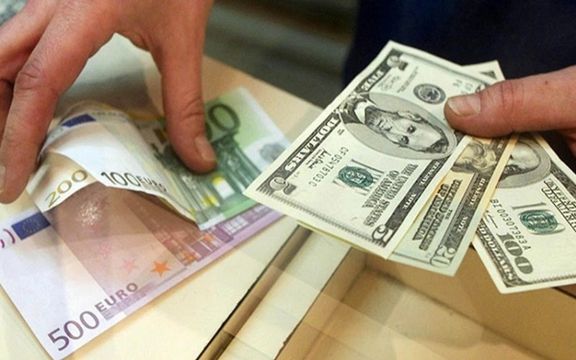
Iran’s rial has fallen 10 percent since early January as tensions have risen in the region, with concerns rising about possible hostilities with the US or Israel.
On Tuesday the US dollar rose to more than 550,000 rials, which means the Iranian currency has fallen 13-fold since 2018, when the United States exited the JCPOA nuclear deal and imposed sanctions on Iran’s oil exports and international banking.
The euro hit 600,000 rials and the British pound traded at 700,000 rials in Tehran's free currency market, which despite some official exchange rates, reflects real exchange rates.
Although during the Biden administration the sanctions have not been rigorously enforced and Iran has been able to somewhat recover its oil exports, the country’s financial situation remains precarious.
The rials fall quickened last week, when Iran fired ballistic missiles at targets in Iraq and Pakistan, claiming retaliation against Israel and terrorists. Pakistan retaliated by airstrikes on targets in Iran, raising concerns about some kind of war breaking out with neighbors, or with the United States and Israel. Already tensions were high because of Iran-backed Houthis attacking commercial vessels in the Red Sea.
The annual inflation rate is at least 50 percent, with rial’s fall signaling higher inflation in the months to come. Monthly salaries for workers are less than $200 a month, as inflation rises faster than salaries in a depressed economy. There have been work stoppages and protests in many sectors, including oil and gas production platforms and refineries. Many essential goods such as wheat and animal feed are imported and rial’s fall signals higher consumer prices.